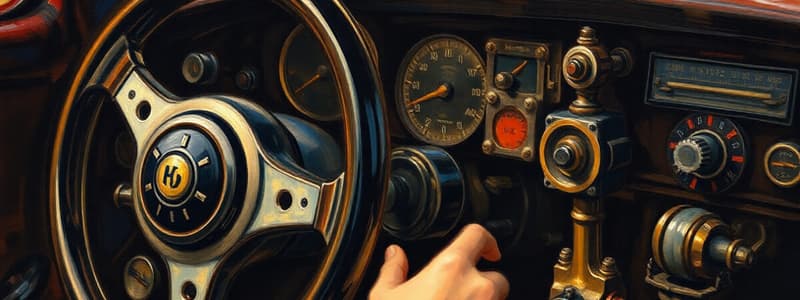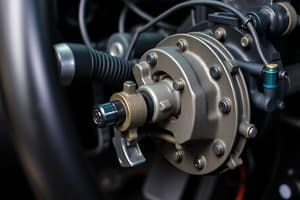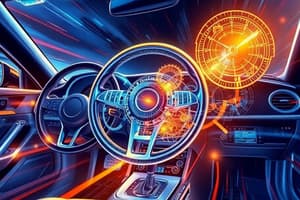Podcast
Questions and Answers
What is the primary purpose of a steering system in a vehicle?
What is the primary purpose of a steering system in a vehicle?
- To increase the speed of the vehicle
- To enhance fuel efficiency
- To allow the vehicle to follow a desired direction (correct)
- To reduce road noise
Which component primarily transfers the motion from the steering wheel to the front wheel hubs?
Which component primarily transfers the motion from the steering wheel to the front wheel hubs?
- Steering shaft (correct)
- Steering gear
- Steering column
- Steering arm
What characteristic should a steering system have to ensure it absorbs shocks from the road?
What characteristic should a steering system have to ensure it absorbs shocks from the road?
- It should incorporate a self-rightening mechanism
- It should provide constant steering effort
- It should isolate the driver from road surface shocks (correct)
- It should have a high level of mechanical advantage
How does the steering gear function in a vehicle's steering system?
How does the steering gear function in a vehicle's steering system?
Which of the following components is NOT part of a typical steering system?
Which of the following components is NOT part of a typical steering system?
What role does the steering column play in the steering system?
What role does the steering column play in the steering system?
Why is the steering system described as needing a certain degree of irreversibility?
Why is the steering system described as needing a certain degree of irreversibility?
What is one function of the steering system related to road feel?
What is one function of the steering system related to road feel?
Which steering gear type transmits the rotary motion of the steering wheel to a piston?
Which steering gear type transmits the rotary motion of the steering wheel to a piston?
What is the function of the tie rods in a rack-and-pinion steering system?
What is the function of the tie rods in a rack-and-pinion steering system?
Which component transfers power from the drive shaft to the ring gear in a differential system?
Which component transfers power from the drive shaft to the ring gear in a differential system?
Why do wheels need to spin at different speeds during a turn?
Why do wheels need to spin at different speeds during a turn?
What is the typical range of steering gearbox ratios?
What is the typical range of steering gearbox ratios?
What does the differential case assembly do in a vehicle's differential system?
What does the differential case assembly do in a vehicle's differential system?
What type of steering system uses hydraulic assistance to reduce applied force on the steering wheel?
What type of steering system uses hydraulic assistance to reduce applied force on the steering wheel?
Flashcards
Steering system
Steering system
A collection of parts that lets a vehicle follow a desired path.
Steering gear box
Steering gear box
Converts steering wheel rotation into the movement of steering linkages.
Steering wheel
Steering wheel
The part that the driver uses to control the direction of the vehicle.
Steering shaft
Steering shaft
Signup and view all the flashcards
Steering column
Steering column
Signup and view all the flashcards
Steering gear function
Steering gear function
Signup and view all the flashcards
Steering system needs
Steering system needs
Signup and view all the flashcards
Steering system function
Steering system function
Signup and view all the flashcards
Steering Ratio
Steering Ratio
Signup and view all the flashcards
Recirculating Ball Steering Gear
Recirculating Ball Steering Gear
Signup and view all the flashcards
Rack-and-Pinion Steering
Rack-and-Pinion Steering
Signup and view all the flashcards
Hydraulic Power Steering
Hydraulic Power Steering
Signup and view all the flashcards
Steering Linkage
Steering Linkage
Signup and view all the flashcards
Differential
Differential
Signup and view all the flashcards
Pinion Drive Gear
Pinion Drive Gear
Signup and view all the flashcards
Ring Gear
Ring Gear
Signup and view all the flashcards
Study Notes
Steering System
- Steering is the collection of components and linkages allowing a vehicle to follow a desired direction
- Automobiles use steering gears and linkages to transfer hand-operated steering wheel movement to the front wheel hubs via the steering column
- Other steering parts include steering wheel pads, shafts, boxes, arms, and stabilizers
Needs of Steering
- Steering should multiply the driver's turning effort
- It should be mostly irreversible, so road shocks aren't transferred to the driver's hands
- Steering mechanisms should have self-rightening, releasing the steering wheel after turning
Function of Steering
- Controls front wheel (sometimes rear wheel) direction
- Transfers road feel (slight steering wheel pull caused by road surface) to the driver
- Maintains the correct amount of effort needed to turn wheels
- Absorbs most of the shocks from the road surface impacting the steering wheel
Layout of a Steering System
- A typical steering system includes a steering wheel, steering shaft, steering gear box, pitman arm, drag link, steering knuckle arm, and track rod arm
Turning the Car
- When turning, the front wheels don't point in the same direction
- The inner wheel travels a shorter distance than the outer wheel
Linkages Steering System
- Linkages (worm gear system) transfer the driver's steering wheel rotation to the steering shaft, through the steering column, and then to the steering gear box
- The steering column supports both the steering column and steering shaft
Steering Gears
- Steering gears convert the steering wheel's rotary motion into a straight-line motion for the linkage with mechanical advantage
- If the steering wheel connected directly to the linkage, more effort would be required to turn the wheels
- A reduction system (steering ratio) is used to assist the driver
Most Useful Steering Gear Systems
- Recirculation ball type steering gear transmits rotary motion from the steering wheel to the piston, along with rack-and-pinion steering, consisting of a rack along its length, and a pinion gear connected to the steering wheel
- Hydraulic power steering utilizes a hydraulic system to multiply the force applied to the steering wheel, making it easier to use
Linkage Steering System (Worm Gear Parts)
- Steering systems (worm gear parts, steering gearbox) transform the turning motion into a straight-line left or right motion
- Steering gearbox ratios generally range from 15:1 to 24:1 (with 15:1, the worm gear turns 15 times to turn the selector shaft once)
- The steering linkage connects the steering gearbox to the steering knuckles and wheels
Basic Rack-and-Pinion Steering
- Gear housing holds the pinion gear and the rack
- Tie rods connect the rack with steering knuckles
Steering Linkage
- Pitman arms transfer gearbox motion to the steering linkage
- Pitman arms are splined to the gearbox
Differential Axle in a Vehicle
- The differential is an integral part of all four-wheel vehicles
- It allows the wheels to turn at different speeds, necessary when a vehicle turns.
Parts of Differential System
- Pinion drive gear transfers power from the drive shaft to the ring gear
- Ring gear transfers power to the differential case assembly
- Spider gears are at the heart of the differential
- Differential case assembly holds and houses the gear drive axels
- Rear drive axel transfers torque from the differential assembly to the drive wheels
Working of Differential System
- When turning, inner and outer wheels travel different distances
- During a right turn, the inner wheels travel a shorter distance than the outer ones
Studying That Suits You
Use AI to generate personalized quizzes and flashcards to suit your learning preferences.




